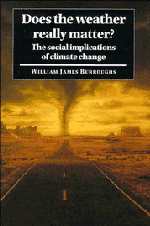6 - Models of the climate and the economy
Published online by Cambridge University Press: 26 February 2010
Summary
‘Write that down,’ the King said to the jury, and the jury eagerly wrote down all three dates on their slates, and then added them up, and reduced the answer to shillings and pence.
Alice's Adventures in Wonderland, Chapter 11
So far we have explored a wide variety of examples of the interaction between extreme weather events, both fleeting and long drawn out, and economic and social developments. While these clearly show that the weather can wreak havoc on all timescales, the nature of this impact varies profoundly from event to event. This means that any attempt to predict the economic consequences of future climatic change faces major challenges. Any forecast must identify with considerable precision not only what type of developments are likely to become more prevalent, but also how out of the ordinary they are likely to be, given the non-linear relationship between such events and the damage they cause. Even if the climate forecasts can rise to this challenge, there is then the next level of complexity of how economic and political structures should respond to sustained abnormal weather.
It would be easy to throw in the towel at this stage. Clearly the complexity of the impacts on society and the responses they evoke are far beyond the current capacity of forecasting systems. But, as noted in Chapter 1, we cannot adopt the defeatist attitude, however realistic it may seem.
- Type
- Chapter
- Information
- Does the Weather Really Matter?The Social Implications of Climate Change, pp. 139 - 173Publisher: Cambridge University PressPrint publication year: 1997



